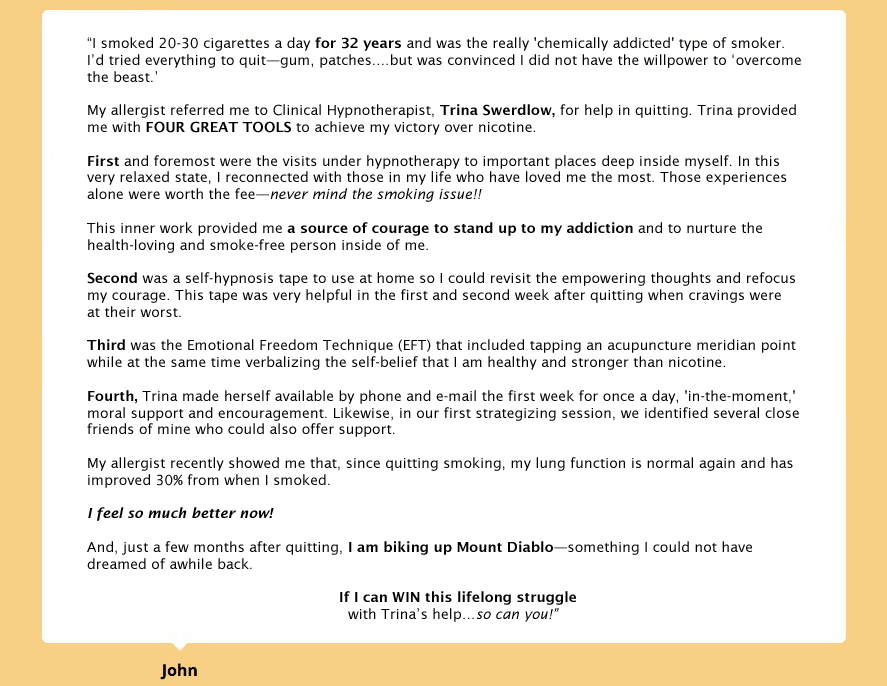Six Scary Facts to Inspire You to Quit Smoking
 1. Someone dies of a tobacco-related illness every 10 seconds.1
1. Someone dies of a tobacco-related illness every 10 seconds.1
2. Cigarettes contain over 4,000 chemicals that include arsenic, carbon monoxide, formaldehyde, lead, and hydrogen cyanide (a lethal gas used in gas chambers).1
3. Smokers who switch to lower nicotine cigarettes inhale more often and deeper — which results in receiving the same amount of the drug.1
4. Over 400,000 people die of tobacco-related illnesses in the United States each year (more deaths than from auto accidents, AIDS, fire, illegal drugs, alcohol, suicides, and homicides combined).1
5. Secondhand smoke (environmental tobacco smoke) causes between 150,000 and 300,000 annual cases of pneumonia or bronchitis in children 18 months and younger.2
6. A cigarette is the only consumer product that kills its consumer when it is used as directed.3
Six Great Reasons to Stop Smoking
After you stop smoking, health benefits begin in minutes:
- Your sense of smell returns and food tastes better.
- Your blood pressure and heart rate drop 20 minutes after quitting.
- Your carbon monoxide level in your blood drops to normal after 12 hours.
- Your lung function and circulation improve within 2 to 12 weeks of quitting.
- Your shortness of breath and coughing decrease one to 9 months after quitting.
- Your risk of heart disease drops to half the risk of a smoker — one year after you quit.”4
Trina’s Comprehensive: Smoking Cessation Program
Customized for your needs, Trina’s comprehensive Smoking Cessation Program includes the use of gentle hypnotherapy and the Emotional Freedom Technique (EFT). Hypnotherapy is a way to relax and calm your mind, body, and emotions. From this deeply relaxed state, through hypnotherapy you will be guided to increase your willpower to quit smoking and decrease your cravings for cigarettes.
EFT is another leading-edge tool to assist you in overcoming your smoking habit. EFT connects with your acupuncture meridian points — without the use of needles. During EFT, the meridians are gently stimulated through tapping with the fingers. EFT is used to clear blocks in the energy system that may be fueling destructive emotions and behaviors. It’s simple and easy to use.
What this Smoking Cessation Program Includes:
- A customized, step-by-step strategy to stop smoking
- Private sessions with Trina to learn self-hypnosis and EFT (so you can use these tools on your own)
- Daily support from Trina via phone or email (during “quit week”)
- A personal plan to CELEBRATE your daily victories!
The customized strategies in your Smoking Cessation Program will work with your schedule and address your specific needs. Before quitting smoking, Trina suggests that you receive feedback from your medical doctor. Your doctor may suggest that you combine using nicotine gum or patches as part of your stop smoking strategy.
In your Smoking Cessation Program, you’ll have the opportunity to see Trina for sessions to simply “prepare yourself” to quit smoking.
For example, at least two preparatory sessions are recommended before you set your “quit smoking date.”
That way, you will have time to develop your skills and confidence in using the stop smoking tools, before you actually quit.
A client’s Success Story:
Imagine Yourself Smoke Free!
Now, are you even more motivated to consider quitting smoking?
If so, imagine yourself — smoke free and receiving the benefits listed earlier:
Your sense of smell returns and food tastes better, your blood pressure and heart rate drop 20 minutes after quitting, your lung function and circulation will improve within 2 to 12 weeks of quitting, your shortness of breath and coughing will decrease one to 9 months after quitting, and your risk of heart disease will drop to half the risk of a smoker — one year after you quit.4
Call Trina today to schedule your free, 15-minute consultation and get on the path toward greater health —
you and your loved ones will be glad you did!
(925) 285-5759
SOURCES
1Tobacco Survivors United
2US Environmental Protection Agency (EPA)
3World Health Organization
4American Cancer Society



